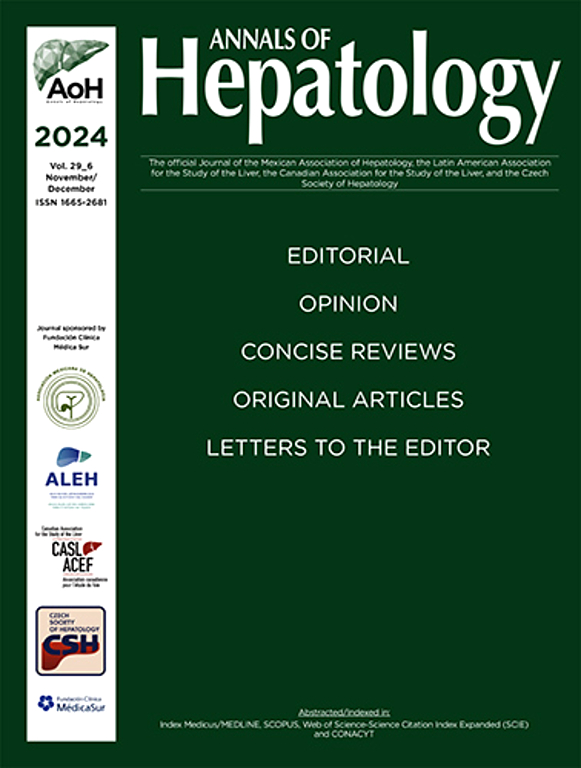重度酒精性肝炎患者补充Omega-5脂肪酸可改善脂质氧化损伤
IF 3.7
3区 医学
Q2 GASTROENTEROLOGY & HEPATOLOGY
引用次数: 0
摘要
长期和过量饮酒可引起酒精性肝病(ALD)。酒精性肝炎(AH)是一种严重的临床事件,发生在ALD和主动饮酒患者中,30天内死亡率很高。炎症和氧化还原失衡在促进肝细胞功能障碍和降低患者生存率方面起着至关重要的作用。糖皮质激素对AH有短暂的有益作用;然而,有必要了解抗氧化治疗在这种病理中的作用。评估Omega-5治疗的酒精性肝炎患者的脂质氧化应激材料和患者该随机双盲临床研究包括两组严重酒精性肝炎患者(男性和女性):1)接受强的松(40 mg/天) + 口服Omega-5 (0.64 g/天)的患者(n=20;10%女性,90%男性),2)强的松 + 安慰剂组(n=20;女性占15%,男性占85%)。两组均治疗28 d。饮酒量以g/d计算。进行生化及血液学化验。在第7、14和28天评估MELD、Glasgow、ABIC和Lille评分,以及通过丙二醛(MDA)进行的血清脂质氧化水平。数据采用Kruskal-Wallis、Mann-Whitney U进行统计分析,采用SPSS v.22进行方差分析,显著性为p<;0.05。结果两组患者特征相似;在严重程度和酒精摄入量方面没有差异。治疗7天后,两组患者MDA水平相近,均为此时MDA水平最高。然而,Omega-5组在第14天观察到血清MDA水平降低(5%);同样,在28天观察到MDA减少22%。相比之下,安慰剂组的丙二醛水平持续增加:分别在14天和28天增加19.6%和35%。然而,没有统计学差异,表明需要进一步的研究来评估6个月内MDA水平的变化,以及不同剂量和补充omega -5时间的影响。结论Omega-5脂肪酸联合强的松口服可在全身水平降低脂质氧化应激。使用抗氧化治疗作为辅助治疗可以改善氧化还原状态和炎症,从而可以减少感染性事件,从而降低酒精性肝炎的死亡率。本文章由计算机程序翻译,如有差异,请以英文原文为准。
Oxidative damage to lipids improves with Omega-5 fatty acid supplementation treatment in patients with severe alcoholic hepatitis
Introduction and Objectives
Chronic and excessive alcohol consumption causes alcoholic liver disease (ALD). Alcoholic hepatitis (AH) is a severe clinical event that develops in patients with ALD and active alcohol consumption, and it has a high mortality rate within 30 days. Inflammation and redox imbalance play a crucial role in promoting the dysfunction of hepatocytes and reducing patient survival. Glucocorticoids have a transient beneficial effect in AH; however, it is necessary to understand the effect of antioxidant therapy in this pathology. To evaluate oxidative stress of lipids in patients with alcoholic hepatitis whose treatment included Omega-5
Materials and Patients
The randomized, double-blind clinical study included two groups of patients (men and women) with severe alcoholic hepatitis: 1) Patients treated with Prednisone (40 mg/day) + oral administration of Omega-5 (0.64 g/day) (n=20; 10% women and 90% men), and 2) Prednisone + Placebo group (n=20; 15% women, 85% men). Both groups received treatment for 28 days. Alcohol consumption was calculated in g/day. Biochemical and hematological laboratory test were performed. The MELD, Glasgow, ABIC, and Lille scales were evaluated, as well as serum levels of lipid oxidation through malondialdehyde (MDA) at 7, 14, and 28 days. The data was analyzed by Kruskal-Wallis, Mann-Whitney U and ANOVA statistical tests by SPSS v.22, significance of p<0.05.
Results
Both groups had similar characteristics; there was no difference in severity and alcohol consumption. After 7 days of treatment, both groups of patients showed similar levels of MDA, with the highest determination of MDA observed at this point. However, a reduction in serum MDA levels was observed at 14 days (5%) in the Omega-5 group; similarly, a 22% reduction in MDA was observed at 28 days. In contrast, the placebo group showed a continuous increase in MDA levels: 19.6% and 35% at 14 and 28 days, respectively. However, there were no statistical differences, indicating the need for further studies to evaluate changes in MDA levels over six months, as well as the effects of different doses and Omega-5supplementation time.
Conclusions
The oral administration of Omega-5 fatty acid in combination with prednisone can reduce oxidative stress of lipids at the systemic level. The use of antioxidant therapy as an adjuvant may improve the redox state and inflammation, which could decrease infectious events and, consequently, mortality in alcoholic hepatitis.
求助全文
通过发布文献求助,成功后即可免费获取论文全文。
去求助
来源期刊

Annals of hepatology
医学-胃肠肝病学
CiteScore
7.90
自引率
2.60%
发文量
183
审稿时长
4-8 weeks
期刊介绍:
Annals of Hepatology publishes original research on the biology and diseases of the liver in both humans and experimental models. Contributions may be submitted as regular articles. The journal also publishes concise reviews of both basic and clinical topics.
 求助内容:
求助内容: 应助结果提醒方式:
应助结果提醒方式:


